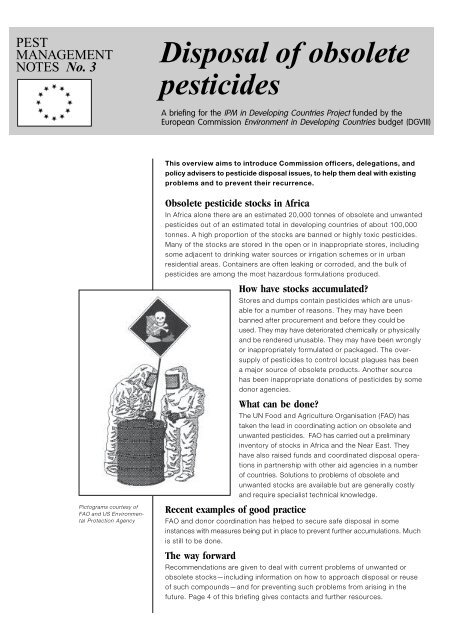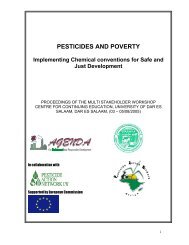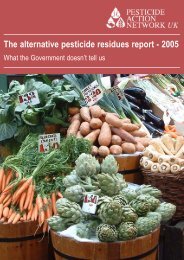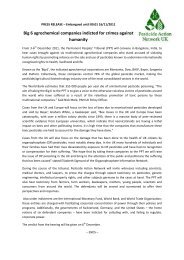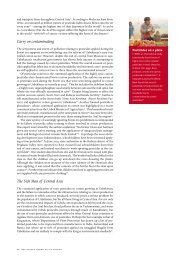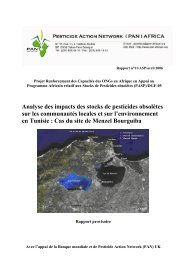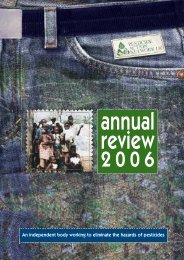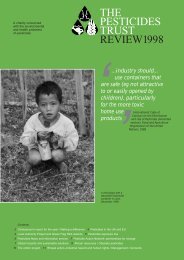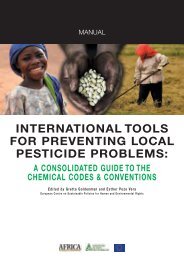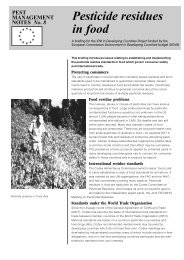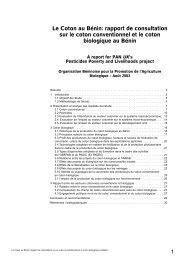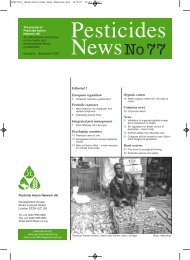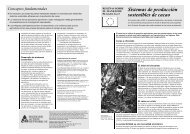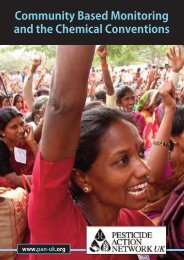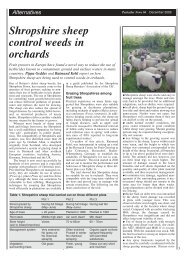Disposal of obsolete pesticides - Pesticide Action Network UK
Disposal of obsolete pesticides - Pesticide Action Network UK
Disposal of obsolete pesticides - Pesticide Action Network UK
You also want an ePaper? Increase the reach of your titles
YUMPU automatically turns print PDFs into web optimized ePapers that Google loves.
PEST<br />
MANAGEMENT<br />
NOTES No. 3<br />
<strong>Disposal</strong> <strong>of</strong> <strong>obsolete</strong><br />
<strong>pesticides</strong><br />
A briefing for the IPM in Developing Countries Project funded by the<br />
European Commission Environment in Developing Countries budget (DGVIII)<br />
This overview aims to introduce Commission <strong>of</strong>ficers, delegations, and<br />
policy advisers to pesticide disposal issues, to help them deal with existing<br />
problems and to prevent their recurrence.<br />
Pictograms courtesy <strong>of</strong><br />
FAO and US Environmental<br />
Protection Agency<br />
Obsolete pesticide stocks in Africa<br />
In Africa alone there are an estimated 20,000 tonnes <strong>of</strong> <strong>obsolete</strong> and unwanted<br />
<strong>pesticides</strong> out <strong>of</strong> an estimated total in developing countries <strong>of</strong> about 100,000<br />
tonnes. A high proportion <strong>of</strong> the stocks are banned or highly toxic <strong>pesticides</strong>.<br />
Many <strong>of</strong> the stocks are stored in the open or in inappropriate stores, including<br />
some adjacent to drinking water sources or irrigation schemes or in urban<br />
residential areas. Containers are <strong>of</strong>ten leaking or corroded, and the bulk <strong>of</strong><br />
<strong>pesticides</strong> are among the most hazardous formulations produced.<br />
How have stocks accumulated?<br />
Stores and dumps contain <strong>pesticides</strong> which are unusable<br />
for a number <strong>of</strong> reasons. They may have been<br />
banned after procurement and before they could be<br />
used. They may have deteriorated chemically or physically<br />
and be rendered unusable. They may have been wrongly<br />
or inappropriately formulated or packaged. The oversupply<br />
<strong>of</strong> <strong>pesticides</strong> to control locust plagues has been<br />
a major source <strong>of</strong> <strong>obsolete</strong> products. Another source<br />
has been inappropriate donations <strong>of</strong> <strong>pesticides</strong> by some<br />
donor agencies.<br />
What can be done?<br />
The UN Food and Agriculture Organisation (FAO) has<br />
taken the lead in coordinating action on <strong>obsolete</strong> and<br />
unwanted <strong>pesticides</strong>. FAO has carried out a preliminary<br />
inventory <strong>of</strong> stocks in Africa and the Near East. They<br />
have also raised funds and coordinated disposal operations<br />
in partnership with other aid agencies in a number<br />
<strong>of</strong> countries. Solutions to problems <strong>of</strong> <strong>obsolete</strong> and<br />
unwanted stocks are available but are generally costly<br />
and require specialist technical knowledge.<br />
Recent examples <strong>of</strong> good practice<br />
FAO and donor coordination has helped to secure safe disposal in some<br />
instances with measures being put in place to prevent further accumulations. Much<br />
is still to be done.<br />
The way forward<br />
Recommendations are given to deal with current problems <strong>of</strong> unwanted or<br />
<strong>obsolete</strong> stocks—including information on how to approach disposal or reuse<br />
<strong>of</strong> such compounds—and for preventing such problems from arising in the<br />
future. Page 4 <strong>of</strong> this briefing gives contacts and further resources.
A large proportion<br />
<strong>of</strong> the <strong>pesticides</strong><br />
in <strong>obsolete</strong> stockpiles<br />
in Africa are<br />
unwanted donations<br />
or banned or<br />
hazardous products.<br />
Obsolete stocks<br />
In Africa and the Near East<br />
there are an estimated<br />
20,000 tonnes <strong>of</strong> <strong>obsolete</strong><br />
<strong>pesticides</strong>. The total <strong>of</strong><br />
<strong>obsolete</strong> pesticide stocks in<br />
the developing world is<br />
thought to be at least<br />
100,000 tonnes. These are<br />
<strong>pesticides</strong> which are unusable<br />
because they have been<br />
banned, have deteriorated<br />
chemically or physically, are<br />
wrongly formulated or<br />
packaged, are in the wrong place or for some other<br />
reason cannot be used.<br />
Many <strong>of</strong> the stocks are stored in the open or in<br />
inappropriate stores including some adjacent to<br />
drinking water sources or irrigation schemes or in<br />
urban residential areas. Many <strong>of</strong> the containers are<br />
leaking or corroded, and many <strong>of</strong> the <strong>pesticides</strong> are<br />
among the most toxic formulations produced.<br />
Banned organochlorines such as dieldrin, aldrin,<br />
chlordane and heptachlor and highly toxic organophosphates<br />
such as parathion, ethoprophos,<br />
dichlorvos and monocrotophos make up a high<br />
proportion <strong>of</strong> the stocks. Dr Bateno <strong>of</strong> the Ministry<br />
<strong>of</strong> Agriculture in Ethiopia, has drawn attention to<br />
the problem: "Obsolete <strong>pesticides</strong> are found in<br />
governmental <strong>of</strong>fices, state farms and some<br />
enterprises ... metallic containers are rusty and<br />
leaking, plastic and paper containers torn. Large<br />
quantities <strong>of</strong> <strong>pesticides</strong> are found spilled in almost<br />
all stores."<br />
Why has the problem arisen?<br />
Many factors have contributed to the formation <strong>of</strong><br />
the present stockpiles <strong>of</strong> <strong>obsolete</strong> <strong>pesticides</strong><br />
including:<br />
❖ Banning <strong>of</strong> products—some <strong>pesticides</strong> were<br />
supplied in large quantities for use in agriculture or<br />
for the control <strong>of</strong> major pest outbreaks such as<br />
locusts or malaria vectors. When the <strong>pesticides</strong><br />
were subsequently banned because <strong>of</strong> their<br />
hazards to health and the environment, the<br />
stocks could no longer be used. An example is<br />
the insecticide dieldrin.<br />
❖ Inadequate stores and poor stock management—in<br />
poor storage conditions pesticide<br />
packaging can become damaged leading to<br />
leakage and exposure <strong>of</strong> the chemicals. The<br />
chemicals can deteriorate and become unusable.<br />
Poor stock management does not ensure<br />
that the oldest products are used first and does<br />
not ensure that good records are kept to<br />
prevent over stocking for example.<br />
❖ Unsuitable products or packaging—sometimes<br />
<strong>pesticides</strong> are supplied in bulk containers which<br />
small scale farmers cannot use, or the packaging<br />
is <strong>of</strong> poor quality and has been damaged.<br />
In other instances <strong>pesticides</strong> are supplied in a<br />
formulation which local users are unable to<br />
apply because they do not have the right<br />
equipment.<br />
❖ Donations or purchases in excess <strong>of</strong> requirements—lack<br />
<strong>of</strong> coordination between donor<br />
agencies and pesticide suppliers has contributed<br />
to over supply <strong>of</strong> <strong>pesticides</strong> and the<br />
build up <strong>of</strong> excessive stocks. There are also<br />
cases where the actions <strong>of</strong> pesticide suppliers<br />
has led to unnecessary or inappropriate<br />
pesticide procurement in developing countries<br />
and the supplies have subsequently joined the<br />
stocks <strong>of</strong> <strong>obsolete</strong> <strong>pesticides</strong>.<br />
What can be done about it?<br />
Obsolete or unwanted <strong>pesticides</strong> should generally<br />
be disposed <strong>of</strong> as toxic waste in accordance<br />
with standards in industrialised countries. In<br />
some cases unwanted <strong>pesticides</strong> can be used if<br />
certain conditions are met. These options require<br />
carefully considered expert advice so that the<br />
most appropriate action can be taken.<br />
Reuse<br />
<strong>Pesticide</strong>s can only be reused if they meet the<br />
following criteria:<br />
❖ they have not been banned and are approved<br />
for use in that territory;<br />
❖ they are in good chemical and physical<br />
condition and are still effective as <strong>pesticides</strong><br />
and will not pose an unreasonable hazard to<br />
health or the environment if they are used;<br />
❖ there is an appropriate use for the pesticide<br />
close to their place <strong>of</strong> storage;<br />
❖ the <strong>pesticides</strong> are in an appropriate form for<br />
local users to handle and apply them.<br />
In some cases, where not all the above criteria<br />
are met, <strong>pesticides</strong> can be transported to another<br />
area where they can be used, or they can be reformulated<br />
to allow them to be used.<br />
Decisions regarding the chemical and physical<br />
state <strong>of</strong> the chemicals, their efficacy,<br />
repackaging, formulation or transport should<br />
only be made by specialists in appropriate fields<br />
who have access to analytical equipment and<br />
other testing facilities. In general these questions<br />
should be referred to the manufacturer <strong>of</strong> the<br />
<strong>pesticides</strong> where they are known, or experienced<br />
pesticide chemists, together with independent<br />
advisors who do not have a commercial interest<br />
in the products or their fate.<br />
<strong>Disposal</strong><br />
In the majority <strong>of</strong> cases, disposal <strong>of</strong> <strong>obsolete</strong><br />
<strong>pesticides</strong> in developing countries entails<br />
repackaging, transportation to Europe and<br />
incineration in dedicated high temperature toxic
<strong>Pesticide</strong> disposal: case studies<br />
1 In 1995 the European Commission procured<br />
230 tonnes <strong>of</strong> the fungicide<br />
mancozeb on behalf <strong>of</strong> Rwanda. The chemical<br />
was formulated using cheap and poor<br />
quality active ingredient from China. It was<br />
shipped to Rwanda and placed in unsuitable<br />
storage facilities in the EC compound<br />
in Kigali, where it caught fire. The fire was<br />
put out but the result was<br />
environmental contamination<br />
and the creation <strong>of</strong> a<br />
continuing health, environmental<br />
and fire hazard.<br />
This situation continued<br />
for nearly two years until<br />
expert advice was sought<br />
to solve the problem. But a<br />
local engineering contractor<br />
was asked to dispose<br />
<strong>of</strong> the hazardous chemicals<br />
and waste, instead <strong>of</strong><br />
a specialised toxic waste<br />
handling contractor.<br />
<strong>Pesticide</strong> store in Seychelles: damaged packaging, unlabelled<br />
containers. Photo courtesy <strong>of</strong> FAO<br />
2 Nearly 300 tonnes <strong>of</strong> <strong>pesticides</strong> at 20 sites<br />
across the republic <strong>of</strong> Yemen were <strong>obsolete</strong>.<br />
Funds raised from the Netherlands Government,<br />
the FAO Technical Cooperative Programme<br />
(TCP) and Germany totalled<br />
US$1.35 million. The FAO coordinated<br />
fundraising, liaison with the Yemen Government,<br />
appointment and overseeing <strong>of</strong> the<br />
disposal contractor.<br />
The appointed disposal<br />
contractor and specially<br />
trained local staff mounted a<br />
six week operation to<br />
repackage <strong>obsolete</strong> <strong>pesticides</strong><br />
at the 20 identified<br />
sites and to completely<br />
decontaminate the stores.<br />
The repackaged <strong>pesticides</strong><br />
were transported overland<br />
to a central store from<br />
which they were shipped to<br />
the <strong>UK</strong> for specialised high<br />
temperature incineration.<br />
waste incinerators. This is a hazardous, difficult<br />
and administratively complex operation which<br />
requires expert knowledge and equipment. It is also<br />
expensive—current costs are US$3,000-<br />
US$4,000 per tonne <strong>of</strong> waste.<br />
Other destruction options have been explored<br />
including incineration in local cement kilns, mobile<br />
incinerators, burial and low technology chemical<br />
treatments. Such practices are generally unsafe and<br />
inappropriate and in most cases would not be<br />
permitted in developed countries for health or<br />
environmental reasons. They also need high levels <strong>of</strong><br />
training, sophisticated equipment and long term<br />
maintenance which are <strong>of</strong>ten inappropriate in<br />
developing countries. Local disposal options should<br />
only be implemented on the advice and with the<br />
agreement and supervision <strong>of</strong> independent experts<br />
and national authorities.<br />
New technologies are under development<br />
including plasma arc, molten metal and<br />
The situation being<br />
desperate and urgent,<br />
disposal <strong>of</strong> these<br />
<strong>pesticides</strong> is among the<br />
national concerns<br />
requiring quick action.<br />
Dr Bateno Kabeto,<br />
Ministry <strong>of</strong> Agriculture, Ethiopia<br />
bioremediation. None <strong>of</strong> these<br />
is currently ready for use in<br />
developing countries.<br />
What is being done?<br />
The UN Food and Agriculture<br />
Organisation (FAO) has taken<br />
the lead in developing and<br />
implementing appropriate<br />
solutions to the problem <strong>of</strong><br />
<strong>obsolete</strong> pesticide stocks in<br />
the developing world. FAO has<br />
carried out a preliminary<br />
inventory <strong>of</strong> stocks in Africa<br />
and the Near East. They have also raised funds<br />
and coordinated disposal operations in partnership<br />
with other aid agencies in a number <strong>of</strong> countries.<br />
Currently funds are being sought for disposal<br />
operations in several African countries.<br />
FAO has also produded a series <strong>of</strong> guidelines<br />
and advice for disposal and for prevention <strong>of</strong> the<br />
accumulation <strong>of</strong> stocks.<br />
Who will pay?<br />
It is generally agreed that the problem <strong>of</strong> <strong>obsolete</strong><br />
pesticide stocks has arisen as a result <strong>of</strong> the<br />
inappropriate actions <strong>of</strong> many players including<br />
donor agencies, industry, governments, advisors<br />
and others. To date disposal operations have<br />
been funded by some national aid agencies, some<br />
contributions from the chemical industry and some<br />
international agency money.<br />
Using development aid money for disposal<br />
operation seems frustrating and unattractive.<br />
However in many cases the presence <strong>of</strong> toxic<br />
<strong>obsolete</strong> <strong>pesticides</strong> acts as a hindrance to<br />
development, for example where water sources<br />
are being contaminated.<br />
It is now widely agreed that all the bodies<br />
which contributed to or pr<strong>of</strong>ited from the creation<br />
<strong>of</strong> the current <strong>obsolete</strong> <strong>pesticides</strong> problem—<br />
including industry—should contribute to its solution.
Key points<br />
❖ <strong>Disposal</strong> <strong>of</strong> <strong>obsolete</strong> <strong>pesticides</strong> requires specialist advice.<br />
❖ Implementation should be in accordance with FAO Guidelines.<br />
❖ International agreements regulate movements <strong>of</strong> waste.<br />
❖ Avoid future problems by ensuring that pesticide procurement is in<br />
keeping with FAO and other appropriate guidelines.<br />
Conclusions<br />
Finding solutions to the current problem <strong>of</strong> <strong>obsolete</strong><br />
<strong>pesticides</strong> stocks must also be linked to<br />
implementation <strong>of</strong> measures to prevent such<br />
problems from arising again. FAO has published<br />
guidelines on the prevention <strong>of</strong> accumulation <strong>of</strong><br />
<strong>obsolete</strong> stocks and on pesticide stock management<br />
as part <strong>of</strong> its work on <strong>obsolete</strong> <strong>pesticides</strong>.<br />
All disposal operations require advice from<br />
experienced independent agencies and experts.<br />
Implementation should be carried out following<br />
FAO guidelines, and in conjunction with FAO's <strong>of</strong>fice<br />
co-ordinating pesticide disposal projects.<br />
There has also been discussion <strong>of</strong> making the<br />
funding and implementation <strong>of</strong> disposal operations<br />
conditional on the recipient country demonstrating<br />
that measures are in place to prevent the problem<br />
from arising again.<br />
International agreements introduced in recent<br />
years are also helping in preventing similar problems<br />
from arising. These include the Basel Convention,<br />
Bamako and OECD agreements on the cross<br />
boundary transportation <strong>of</strong> toxic waste and the Prior<br />
Informed Consent (PIC) agreement on trade in<br />
hazardous chemicals.<br />
It is also crucial that donor agencies—including the<br />
EU—maintain strict control over the procurement and<br />
supply <strong>of</strong> <strong>pesticides</strong> to prevent the current problems<br />
<strong>of</strong> <strong>obsolete</strong> pesticide stocks in developing<br />
countries from recurring. Other briefings in this<br />
series deal with issues <strong>of</strong> appropriate pesticide<br />
procurement so that hazardous or other <strong>pesticides</strong><br />
are not over-stocked and then stored.<br />
Resources<br />
Publications<br />
FAO <strong>Pesticide</strong> <strong>Disposal</strong> Series:<br />
Prevention and disposal <strong>of</strong> <strong>obsolete</strong> and unwanted<br />
pesticide stocks in Africa and the Near East. The<br />
first FAO consultation meeting. Rome, 1995<br />
Provisional guidelines on prevention <strong>of</strong> accumulation<br />
<strong>of</strong> <strong>obsolete</strong> pesticide stocks, Rome, 1995<br />
<strong>Pesticide</strong> storage and stock control manual, Rome,<br />
1996<br />
<strong>Disposal</strong> <strong>of</strong> bulk quantities <strong>of</strong> <strong>obsolete</strong> <strong>pesticides</strong> in<br />
developing countries: Provisional technical guidelines,<br />
Rome 1996<br />
Prevention and disposal <strong>of</strong> <strong>obsolete</strong> and unwanted<br />
pesticide stocks in Africa and the Near East. The<br />
second FAO consultation meeting. Rome, 1997<br />
International code <strong>of</strong> conduct on the distribution and use<br />
<strong>of</strong> <strong>pesticides</strong> (amended version), FAO, Rome, 1990<br />
Provisional guidelines on tender procedures for the<br />
procurement <strong>of</strong> <strong>pesticides</strong>, FAO, Rome, 1994<br />
<strong>Disposal</strong> <strong>of</strong> unwanted pesticide stocks: guidance on<br />
the selection <strong>of</strong> practical options, 1991. GIFAP (from<br />
GCPF, Avenue Albert Lancaster 79A, B-1180<br />
Brussels)<br />
Guidelines for aid agencies on pest and pesticide<br />
management. DAC guidelines on aid and environment,<br />
No.6. OECD, Paris 1995.<br />
Organisations<br />
FAO: the management <strong>of</strong> <strong>obsolete</strong> <strong>pesticides</strong> is<br />
complex and hazardous. Only appropriately qualified,<br />
experienced and equipped individuals and organisations<br />
should deal with them. Advice is available from<br />
FAO Plant Protection Service, Plant Production and<br />
Protection Division, Viale delle Terme di Caracalla,<br />
00100 Rome, Italy. Tel. +39 6 5705 5192, fax +39 6<br />
5705 6347, email Alemayehu.Wodageneh@fao.org<br />
GTZ (Deutsche Gesellschaft fur Technische<br />
Zusammenarbeit) has wide experience <strong>of</strong> disposal<br />
programmes in Africa. Contact Stephan Krall, GTZ,<br />
OE 4232 Pflanzenschutz, Dag Hammarskjoldweg 1-<br />
5, D-65760 Eschborn, German, (Tel +49 6196 79<br />
1428; fax +49 6196 79 7173).<br />
PESTICIDE<br />
ACTION<br />
NETWORK <strong>UK</strong><br />
Obsolete <strong>pesticides</strong>, PMN No. 3, April, 1998.<br />
This briefing is one <strong>of</strong> a series prepared by <strong>Pesticide</strong> <strong>Action</strong><br />
<strong>Network</strong> <strong>UK</strong> (PAN <strong>UK</strong>), which is responsible for its contents, as<br />
consultants to DGVIII <strong>of</strong> the EC. PAN <strong>UK</strong> is an independent charity<br />
working to reduce pesticide problems in developing countries. Its<br />
quarterly journal <strong>Pesticide</strong>s News reports on <strong>pesticides</strong> and IPM.<br />
Contact Mark Davis, Barbara Dinham or Stephanie Williamson at<br />
<strong>Pesticide</strong> <strong>Action</strong> <strong>Network</strong> <strong>UK</strong>,<br />
Eurolink Centre, 49 Effra Road, London SW2 1BZ, <strong>UK</strong><br />
Tel +44 20 7274 8895 Fax +44 20 7274 9084<br />
Email admin@pan-uk.org, Website www.pan-uk.org


